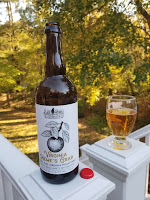The Level 1 CCP exam focuses on seven categories (1) Apples, the Orchard & History; (2) Cidermaking; (3) Evaluation; (4) Families & Flavor; (5) Keeping & Serving; (6) Food & Cider; and (7) Social Responsibility. I will now present the Virginia Hewe's Crab cider in terms of reviewing for the CCP.
Sage Bird Ciderworks is located in downtown Harrisonburg, Virginia and opened a couple years ago due to the persistent hard work of Zach and Amberlee Carlson. This is the first cidery in the home of the Dukes and they offer a wide array of various styles and apple varieties including Hewe's Crab from their Age Old Apples series.
Hewe's Crab was once the most popular apple variety in Virginia and is thought to be a cross between the native American crabapple, Malus angustifolia, and a domesticated European apple. The Hewe's Crab apples for this cider were harvested from orchards in the mountains surrounding the Shenandoah Valley. These are most likely low-density and freestanding orchards with relatively wide spacing between the trees. Each individual tree is also most likely a graft of a Hewe's Crab scion fused to a rooted tree.
The Hewe's Crab apple itself is considered Bittersharp with the bitter implying high tannins (polyphenols) and the sharp implying high acidity (malic acid). This is based on the Long Ashton Research Station (LARS) classification. The tannins and acidity can provide this cider the capability to age. The apple's flesh is white so makes a clear cider as opposed to some cider apples with pinkish flesh which can add a little color to the cider without having to macerate on their skins - unlike red wine grapes. However, I believe this cider was aged several months in oak which will impart color and other flavors.
Let's look at this particular cider bottle. Since the cider is over 7% abv, its label is regulated by the TTB, whereas labels for ciders under 7% are regulated by the FDA. The TTP requires the ABV, total volume, name and address of the producers, and whether the cider contains sulfites. You will not see vintages or designated geographic areas like the wine AVA system. This label provides additional information stating its sweetness level (dry) and composition -- 100% Virginia grown, single heirloom Hewe's Crab Apples.This Virginia Hewe's Crab cider is made from 100% apples and thus falls into the cider category as opposed to the Perry, Fruit Cider, Botanical Cider, or Dessert Cider categories. The ACA uses five commonly accepted flavors that we can taste so let's examine this cider in terms of sweetness, acidity/sourness, bitterness, salt, and savoriness. This is a caramel-colored cider, completely dry, with a tart, tannic, and full-bodied. There is a general savoriness I think both from the flesh and the oak treatment. The cider also provides an interesting array of pineapples, raisins, and a little saltiness or saline.
The ACA recommends several food and cider pairings - particularly with a Bittersharp cider apple like this Virginia Hewe's Crab. The acidity has a cleansing quality that cuts through fat and rich flavors and thus refreshes the palate. High tannins can have a similar effect. Think beef short ribs, pork schnitzel, sausage, nutty and mushroom flavors, and dense cheeses. And because of the cider's rich tannins, it can be paired with similar intense foods and not be overwhelmed.
The preparation for the CCP sure increases the amount of information to process when evaluating a cider. Cheers.


